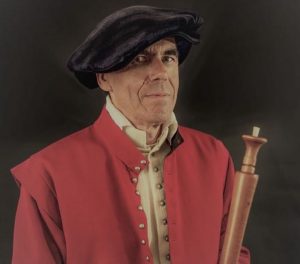 The first known record of the Doncaster Waites is from 1457 when the Piper brothers were elected Waites or Pipers. By 1585 their numbers had risen to four and their duties had been established as musical night watchmen and civic entertainers. In 1617 their role was further defined and they were provided with livery coats by the corporation. Uniforms were then provided right up to their demise in 1832.
The first known record of the Doncaster Waites is from 1457 when the Piper brothers were elected Waites or Pipers. By 1585 their numbers had risen to four and their duties had been established as musical night watchmen and civic entertainers. In 1617 their role was further defined and they were provided with livery coats by the corporation. Uniforms were then provided right up to their demise in 1832.
Waites’ duties primarily consisted of patrolling the streets at night during the dark winter months, playing their instruments and giving out the cry “Past 8 o’clock (or whatever) and all’s well.” This was coupled with performing for civic entertainments, banquets and balls, playing in procession for the mayor making and public proclamations, as well as attending the mayor to church on Sundays and festivals. They also held a monopoly for entertainment in the town and would play for weddings and other private functions as well as earning money from early morning calls or “hunts up” those going hunting or in Doncaster’s case, catching the early stage coach. One particular function in which Doncaster seems to have been unique was for the Waites to ascend St. George’s church tower on bonfire night and play from there, for which they received the princely sum of 1s 6d!
Doncaster is unusual in that it is one of only three places in the country to possess a Mansion House, the others being in York and London. The Mansion House was used primarily for entertainment, and Doncaster’s contains no fewer than three minstrel’s galleries, all of which must have been familiar to the Waites.
The Waites existed until 1832, when a series of deaths in their numbers gave the corporation the opportunity to dispense with what had by then become an anachronism, the corporation itself suffering the same fate three years later for the same reason.
If you would like more historical information about Waites please contact us or visit the Waits website at www.townwaits.org.uk
